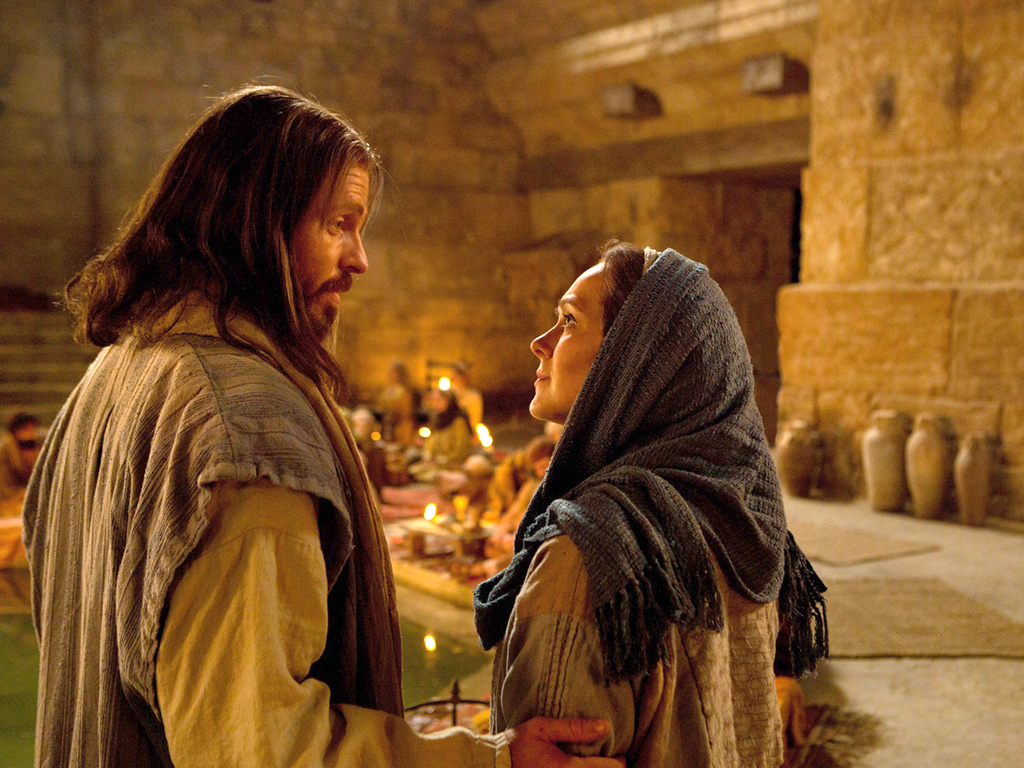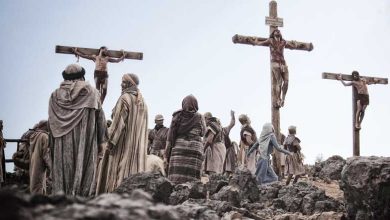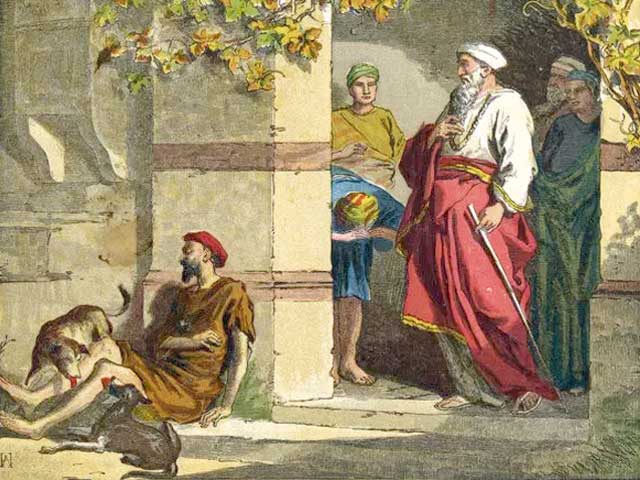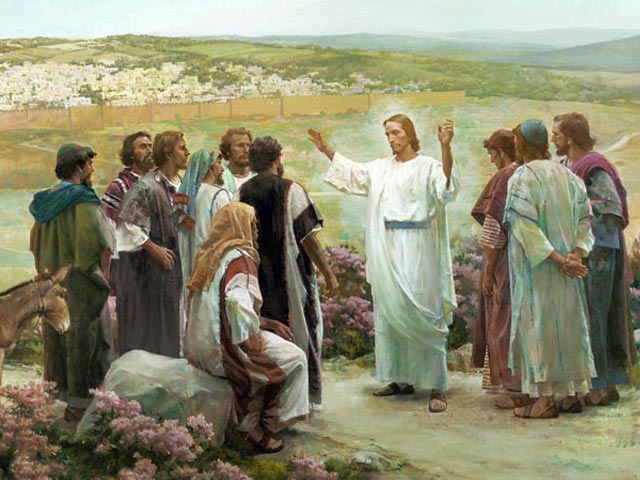Daily Readings Audio | November 15, 2021 – November 21, 2021
Monday of the Thirty-third Week in Ordinary Time
Lectionary: 497
Reading I
[From the descendants of Alexander’s officers]
there sprang a sinful offshoot, Antiochus Epiphanes,
son of King Antiochus, once a hostage at Rome.
He became king in the year one hundred and thirtyseven
of the kingdom of the Greeks.
In those days there appeared in Israel
men who were breakers of the law,
and they seduced many people, saying:
“Let us go and make an alliance with the Gentiles all around us;
since we separated from them, many evils have come upon us.”
The proposal was agreeable;
some from among the people promptly went to the king,
and he authorized them to introduce the way of living
of the Gentiles.
Thereupon they built a gymnasium in Jerusalem
according to the Gentile custom.
They covered over the mark of their circumcision
and abandoned the holy covenant;
they allied themselves with the Gentiles
and sold themselves to wrongdoing.
Then the king wrote to his whole kingdom that all should be one people,
each abandoning his particular customs.
All the Gentiles conformed to the command of the king,
and many children of Israel were in favor of his religion;
they sacrificed to idols and profaned the sabbath.
On the fifteenth day of the month Chislev,
in the year one hundred and forty-five,
the king erected the horrible abomination
upon the altar of burnt offerings
and in the surrounding cities of Judah they built pagan altars.
They also burned incense at the doors of the houses and in the streets.
Any scrolls of the law which they found they tore up and burnt.
Whoever was found with a scroll of the covenant,
and whoever observed the law,
was condemned to death by royal decree.
But many in Israel were determined
and resolved in their hearts not to eat anything unclean;
they preferred to die rather than to be defiled with unclean food
or to profane the holy covenant; and they did die.
Terrible affliction was upon Israel.
Responsorial Psalm
R. (see 88) Give me life, O Lord, and I will do your commands.
Indignation seizes me because of the wicked
who forsake your law.
R. Give me life, O Lord, and I will do your commands.
Though the snares of the wicked are twined about me,
your law I have not forgotten.
R. Give me life, O Lord, and I will do your commands.
Redeem me from the oppression of men,
that I may keep your precepts.
R. Give me life, O Lord, and I will do your commands.
I am attacked by malicious persecutors
who are far from your law.
R. Give me life, O Lord, and I will do your commands.
Far from sinners is salvation,
because they seek not your statutes.
R. Give me life, O Lord, and I will do your commands.
I beheld the apostates with loathing,
because they kept not to your promise.
R. Give me life, O Lord, and I will do your commands.
Alleluia
R. Alleluia, alleluia.
I am the light of the world, says the Lord;
whoever follows me will have the light of life.
R. Alleluia, alleluia.
Gospel
As Jesus approached Jericho
a blind man was sitting by the roadside begging,
and hearing a crowd going by, he inquired what was happening.
They told him,
“Jesus of Nazareth is passing by.”
He shouted, “Jesus, Son of David, have pity on me!”
The people walking in front rebuked him,
telling him to be silent,
but he kept calling out all the more,
“Son of David, have pity on me!”
Then Jesus stopped and ordered that he be brought to him;
and when he came near, Jesus asked him,
“What do you want me to do for you?”
He replied, “Lord, please let me see.”
Jesus told him, “Have sight; your faith has saved you.”
He immediately received his sight
and followed him, giving glory to God.
When they saw this, all the people gave praise to God.

Tuesday of the Thirty-third Week in Ordinary Time
Lectionary: 498
Reading I
Eleazar, one of the foremost scribes,
a man of advanced age and noble appearance,
was being forced to open his mouth to eat pork.
But preferring a glorious death to a life of defilement,
he spat out the meat,
and went forward of his own accord to the instrument of torture,
as people ought to do who have the courage to reject the food
which it is unlawful to taste even for love of life.
Those in charge of that unlawful ritual meal took the man aside privately,
because of their long acquaintance with him,
and urged him to bring meat of his own providing,
such as he could legitimately eat,
and to pretend to be eating some of the meat of the sacrifice
prescribed by the king;
in this way he would escape the death penalty,
and be treated kindly because of their old friendship with him.
But Eleazar made up his mind in a noble manner,
worthy of his years, the dignity of his advanced age,
the merited distinction of his gray hair,
and of the admirable life he had lived from childhood;
and so he declared that above all
he would be loyal to the holy laws given by God.
He told them to send him at once
to the abode of the dead, explaining:
“At our age it would be unbecoming to make such a pretense;
many young people would think the ninety-year-old Eleazar
had gone over to an alien religion.
Should I thus pretend for the sake of a brief moment of life,
they would be led astray by me,
while I would bring shame and dishonor on my old age.
Even if, for the time being, I avoid the punishment of men,
I shall never, whether alive or dead,
escape the hands of the Almighty.
Therefore, by manfully giving up my life now,
I will prove myself worthy of my old age,
and I will leave to the young a noble example
of how to die willingly and generously
for the revered and holy laws.”
Eleazar spoke thus,
and went immediately to the instrument of torture.
Those who shortly before had been kindly disposed,
now became hostile toward him because what he had said
seemed to them utter madness.
When he was about to die under the blows,
he groaned and said:
“The Lord in his holy knowledge knows full well that,
although I could have escaped death,
I am not only enduring terrible pain in my body from this scourging,
but also suffering it with joy in my soul
because of my devotion to him.”
This is how he died,
leaving in his death a model of courage
and an unforgettable example of virtue
not only for the young but for the whole nation.
Responsorial Psalm
R. (6b) The Lord upholds me.
O LORD, how many are my adversaries!
Many rise up against me!
Many are saying of me,
“There is no salvation for him in God.”
R. The Lord upholds me.
But you, O LORD, are my shield;
my glory, you lift up my head!
When I call out to the LORD,
he answers me from his holy mountain.
R. The Lord upholds me.
When I lie down in sleep,
I wake again, for the LORD sustains me.
I fear not the myriads of people
arrayed against me on every side.
R. The Lord upholds me.
Alleluia
R. Alleluia, alleluia.
God loved us, and sent his Son
as expiation for our sins.
R. Alleluia, alleluia.
Gospel
At that time Jesus came to Jericho and intended to pass through the town.
Now a man there named Zacchaeus,
who was a chief tax collector and also a wealthy man,
was seeking to see who Jesus was;
but he could not see him because of the crowd,
for he was short in stature.
So he ran ahead and climbed a sycamore tree in order to see Jesus,
who was about to pass that way.
When he reached the place, Jesus looked up and said,
“Zacchaeus, come down quickly,
for today I must stay at your house.”
And he came down quickly and received him with joy.
When they saw this, they began to grumble, saying,
“He has gone to stay at the house of a sinner.”
But Zacchaeus stood there and said to the Lord,
“Behold, half of my possessions, Lord, I shall give to the poor,
and if I have extorted anything from anyone
I shall repay it four times over.”
And Jesus said to him,
“Today salvation has come to this house
because this man too is a descendant of Abraham.
For the Son of Man has come to seek
and to save what was lost.”

- Readings for the Optional Memorial of Saint Margaret of Scotland
- Readings for the Optional Memorial of Saint Gertrude, virgin

- Readings for the Memorial of Saint Elizabeth of Hungary, religious
Memorial of Saint Elizabeth of Hungary, Religious
Lectionary: 499
Reading I
It happened that seven brothers with their mother were arrested
and tortured with whips and scourges by the king,
to force them to eat pork in violation of God’s law.
Most admirable and worthy of everlasting remembrance was the mother,
who saw her seven sons perish in a single day,
yet bore it courageously because of her hope in the Lord.
Filled with a noble spirit that stirred her womanly heart with manly courage,
she exhorted each of them
in the language of their ancestors with these words:
“I do not know how you came into existence in my womb;
it was not I who gave you the breath of life,
nor was it I who set in order
the elements of which each of you is composed.
Therefore, since it is the Creator of the universe
who shapes each man’s beginning,
as he brings about the origin of everything,
he, in his mercy,
will give you back both breath and life,
because you now disregard yourselves for the sake of his law.”
Antiochus, suspecting insult in her words,
thought he was being ridiculed.
As the youngest brother was still alive, the king appealed to him,
not with mere words, but with promises on oath,
to make him rich and happy if he would abandon his ancestral customs:
he would make him his Friend
and entrust him with high office.
When the youth paid no attention to him at all,
the king appealed to the mother,
urging her to advise her boy to save his life.
After he had urged her for a long time,
she went through the motions of persuading her son.
In derision of the cruel tyrant,
she leaned over close to her son and said in their native language:
“Son, have pity on me, who carried you in my womb for nine months,
nursed you for three years, brought you up,
educated and supported you to your present age.
I beg you, child, to look at the heavens and the earth
and see all that is in them;
then you will know that God did not make them out of existing things;
and in the same way the human race came into existence.
Do not be afraid of this executioner,
but be worthy of your brothers and accept death,
so that in the time of mercy I may receive you again with them.”
She had scarcely finished speaking when the youth said:
“What are you waiting for?
I will not obey the king’s command.
I obey the command of the law given to our fathers through Moses.
But you, who have contrived every kind of affliction for the Hebrews,
will not escape the hands of God.”
Responsorial Psalm
R. (15b) Lord, when your glory appears, my joy will be full.
Hear, O LORD, a just suit;
attend to my outcry;
hearken to my prayer from lips without deceit.
R. Lord, when your glory appears, my joy will be full.
My steps have been steadfast in your paths,
my feet have not faltered.
I call upon you, for you will answer me, O God;
incline your ear to me; hear my word.
R. Lord, when your glory appears, my joy will be full.
Keep me as the apple of your eye;
hide me in the shadow of your wings.
But I in justice shall behold your face;
on waking, I shall be content in your presence.
R. Lord, when your glory appears, my joy will be full.
Alleluia
R. Alleluia, alleluia.
I chose you from the world,
to go and bear fruit that will last, says the Lord.
R. Alleluia, alleluia.
Gospel
While people were listening to Jesus speak,
he proceeded to tell a parable because he was near Jerusalem
and they thought that the Kingdom of God
would appear there immediately.
So he said,
“A nobleman went off to a distant country
to obtain the kingship for himself and then to return.
He called ten of his servants and gave them ten gold coins
and told them, ‘Engage in trade with these until I return.’
His fellow citizens, however, despised him
and sent a delegation after him to announce,
‘We do not want this man to be our king.’
But when he returned after obtaining the kingship,
he had the servants called, to whom he had given the money,
to learn what they had gained by trading.
The first came forward and said,
‘Sir, your gold coin has earned ten additional ones.’
He replied, ‘Well done, good servant!
You have been faithful in this very small matter;
take charge of ten cities.’
Then the second came and reported,
‘Your gold coin, sir, has earned five more.’
And to this servant too he said,
‘You, take charge of five cities.’
Then the other servant came and said,
‘Sir, here is your gold coin;
I kept it stored away in a handkerchief,
for I was afraid of you, because you are a demanding man;
you take up what you did not lay down
and you harvest what you did not plant.’
He said to him,
‘With your own words I shall condemn you,
you wicked servant.
You knew I was a demanding man,
taking up what I did not lay down
and harvesting what I did not plant;
why did you not put my money in a bank?
Then on my return I would have collected it with interest.’
And to those standing by he said,
‘Take the gold coin from him
and give it to the servant who has ten.’
But they said to him,
‘Sir, he has ten gold coins.’
He replied, ‘I tell you,
to everyone who has, more will be given,
but from the one who has not,
even what he has will be taken away.
Now as for those enemies of mine who did not want me as their king,
bring them here and slay them before me.’”
After he had said this,
he proceeded on his journey up to Jerusalem.
Thursday of the Thirty-third Week in Ordinary Time
Lectionary: 500
Reading I
The officers of the king in charge of enforcing the apostasy
came to the city of Modein to organize the sacrifices.
Many of Israel joined them,
but Mattathias and his sons gathered in a group apart.
Then the officers of the king addressed Mattathias:
“You are a leader, an honorable and great man in this city,
supported by sons and kin.
Come now, be the first to obey the king’s command,
as all the Gentiles and the men of Judah
and those who are left in Jerusalem have done.
Then you and your sons shall be numbered among the King’s Friends,
and shall be enriched with silver and gold and many gifts.”
But Mattathias answered in a loud voice:
“Although all the Gentiles in the king’s realm obey him,
so that each forsakes the religion of his fathers
and consents to the king’s orders,
yet I and my sons and my kin
will keep to the covenant of our fathers.
God forbid that we should forsake the law and the commandments.
We will not obey the words of the king
nor depart from our religion in the slightest degree.”
As he finished saying these words,
a certain Jew came forward in the sight of all
to offer sacrifice on the altar in Modein
according to the king’s order.
When Mattathias saw him, he was filled with zeal;
his heart was moved and his just fury was aroused;
he sprang forward and killed him upon the altar.
At the same time, he also killed the messenger of the king
who was forcing them to sacrifice,
and he tore down the altar.
Thus he showed his zeal for the law,
just as Phinehas did with Zimri, son of Salu.
Then Mattathias went through the city shouting,
“Let everyone who is zealous for the law
and who stands by the covenant follow after me!”
Thereupon he fled to the mountains with his sons,
leaving behind in the city all their possessions.
Many who sought to live according to righteousness and religious custom
went out into the desert to settle there.
Responsorial Psalm
R. (23b) To the upright I will show the saving power of God.
God the LORD has spoken and summoned the earth,
from the rising of the sun to its setting.
From Zion, perfect in beauty,
God shines forth.
R. To the upright I will show the saving power of God.
“Gather my faithful ones before me,
those who have made a covenant with me by sacrifice.”
And the heavens proclaim his justice;
for God himself is the judge.
R. To the upright I will show the saving power of God.
“Offer to God praise as your sacrifice
and fulfill your vows to the Most High;
Then call upon me in time of distress;
I will rescue you, and you shall glorify me.”
R. To the upright I will show the saving power of God.
Alleluia
R. Alleluia, alleluia.
If today you hear his voice,
harden not your hearts.
R. Alleluia, alleluia.
Gospel
As Jesus drew near Jerusalem,
he saw the city and wept over it, saying,
“If this day you only knew what makes for peace–
but now it is hidden from your eyes.
For the days are coming upon you
when your enemies will raise a palisade against you;
they will encircle you and hem you in on all sides.
They will smash you to the ground and your children within you,
and they will not leave one stone upon another within you
because you did not recognize the time of your visitation.”


- Readings for the Optional Memorial of Saint Rose Philippine Duchesne, virgin
- Readings for the Optional Memorial of Dedication of the Basilicas of Saints Peter and Paul, Apostles
Friday of the Thirty-third Week in Ordinary Time
Lectionary: 501
Reading I
Judas and his brothers said,
“Now that our enemies have been crushed,
let us go up to purify the sanctuary and rededicate it.”
So the whole army assembled, and went up to Mount Zion.
Early in the morning on the twenty-fifth day of the ninth month,
that is, the month of Chislev,
in the year one hundred and forty-eight,
they arose and offered sacrifice according to the law
on the new altar of burnt offerings that they had made.
On the anniversary of the day on which the Gentiles had defiled it,
on that very day it was reconsecrated
with songs, harps, flutes, and cymbals.
All the people prostrated themselves and adored and praised Heaven,
who had given them success.
For eight days they celebrated the dedication of the altar
and joyfully offered burnt offerings and sacrifices
of deliverance and praise.
They ornamented the facade of the temple with gold crowns and shields;
they repaired the gates and the priests’ chambers
and furnished them with doors.
There was great joy among the people
now that the disgrace of the Gentiles was removed.
Then Judas and his brothers and the entire congregation of Israel
decreed that the days of the dedication of the altar
should be observed with joy and gladness
on the anniversary every year for eight days,
from the twenty-fifth day of the month Chislev.
Responsorial Psalm
R. (13b) We praise your glorious name, O mighty God.
“Blessed may you be, O LORD,
God of Israel our father,
from eternity to eternity.”
R. We praise your glorious name, O mighty God.
“Yours, O LORD, are grandeur and power,
majesty, splendor, and glory.
For all in heaven and on earth is yours.”
R. We praise your glorious name, O mighty God.
“Yours, O LORD, is the sovereignty;
you are exalted as head over all.
Riches and honor are from you.”
R. We praise your glorious name, O mighty God.
“You have dominion over all,
In your hand are power and might;
it is yours to give grandeur and strength to all.”
R. We praise your glorious name, O mighty God.
Alleluia
R. Alleluia, alleluia.
My sheep hear my voice, says the Lord;
I know them, and they follow me.
R. Alleluia, alleluia.
Gospel
Jesus entered the temple area and proceeded to drive out
those who were selling things, saying to them,
“It is written, My house shall be a house of prayer,
but you have made it a den of thieves.”
And every day he was teaching in the temple area.
The chief priests, the scribes, and the leaders of the people, meanwhile,
were seeking to put him to death,
but they could find no way to accomplish their purpose
because all the people were hanging on his words.
Saturday of the Thirty-third Week in Ordinary Time
Lectionary: 502
Reading I
As King Antiochus was traversing the inland provinces,
he heard that in Persia there was a city called Elymais,
famous for its wealth in silver and gold,
and that its temple was very rich,
containing gold helmets, breastplates, and weapons
left there by Alexander, son of Philip,
king of Macedon, the first king of the Greeks.
He went therefore and tried to capture and pillage the city.
But he could not do so,
because his plan became known to the people of the city
who rose up in battle against him.
So he retreated and in great dismay withdrew from there
to return to Babylon.
While he was in Persia, a messenger brought him news
that the armies sent into the land of Judah had been put to flight;
that Lysias had gone at first with a strong army
and been driven back by the children of Israel;
that they had grown strong
by reason of the arms, men, and abundant possessions
taken from the armies they had destroyed;
that they had pulled down the Abomination
which he had built upon the altar in Jerusalem;
and that they had surrounded with high walls
both the sanctuary, as it had been before,
and his city of Beth-zur.
When the king heard this news,
he was struck with fear and very much shaken.
Sick with grief because his designs had failed, he took to his bed.
There he remained many days, overwhelmed with sorrow,
for he knew he was going to die.
So he called in all his Friends and said to them:
“Sleep has departed from my eyes,
for my heart is sinking with anxiety.
I said to myself: ‘Into what tribulation have I come,
and in what floods of sorrow am I now!
Yet I was kindly and beloved in my rule.’
But I now recall the evils I did in Jerusalem,
when I carried away all the vessels of gold and silver
that were in it, and for no cause
gave orders that the inhabitants of Judah be destroyed.
I know that this is why these evils have overtaken me;
and now I am dying, in bitter grief, in a foreign land.”
Responsorial Psalm
R. (see 16a) I will rejoice in your salvation, O Lord.
I will give thanks to you, O LORD, with all my heart;
I will declare all your wondrous deeds.
I will be glad and exult in you;
I will sing praise to your name, Most High.
R. I will rejoice in your salvation, O Lord.
Because my enemies are turned back,
overthrown and destroyed before you.
You rebuked the nations and destroyed the wicked;
their name you blotted out forever and ever.
R. I will rejoice in your salvation, O Lord.
The nations are sunk in the pit they have made;
in the snare they set, their foot is caught.
For the needy shall not always be forgotten,
nor shall the hope of the afflicted forever perish.
R. I will rejoice in your salvation, O Lord.
Alleluia
R. Alleluia, alleluia.
Our Savior Jesus Christ has destroyed death
and brought life to light through the Gospel.
R. Alleluia, alleluia.
Gospel
Some Sadducees, those who deny that there is a resurrection,
came forward and put this question to Jesus, saying,
“Teacher, Moses wrote for us,
If someone’s brother dies leaving a wife but no child,
his brother must take the wife
and raise up descendants for his brother.
Now there were seven brothers;
the first married a woman but died childless.
Then the second and the third married her,
and likewise all the seven died childless.
Finally the woman also died.
Now at the resurrection whose wife will that woman be?
For all seven had been married to her.”
Jesus said to them,
“The children of this age marry and remarry;
but those who are deemed worthy to attain to the coming age
and to the resurrection of the dead
neither marry nor are given in marriage.
They can no longer die,
for they are like angels;
and they are the children of God
because they are the ones who will rise.
That the dead will rise
even Moses made known in the passage about the bush,
when he called ‘Lord’
the God of Abraham, the God of Isaac, and the God of Jacob;
and he is not God of the dead, but of the living,
for to him all are alive.”
Some of the scribes said in reply,
“Teacher, you have answered well.”
And they no longer dared to ask him anything.
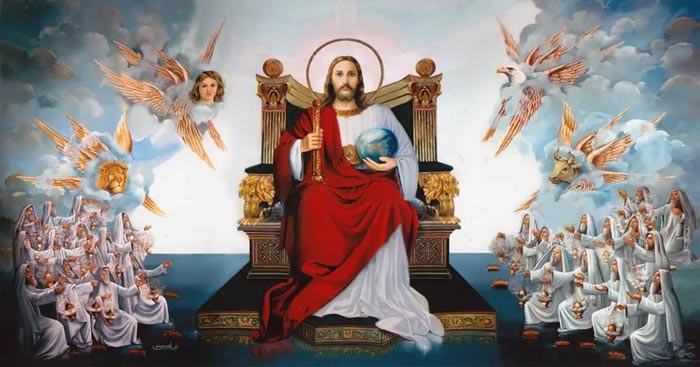
The Solemnity of Our Lord Jesus Christ, King of the Universe
Lectionary: 161
Reading I
As the visions during the night continued, I saw
one like a Son of man coming,
on the clouds of heaven;
when he reached the Ancient One
and was presented before him,
the one like a Son of man received dominion, glory, and kingship;
all peoples, nations, and languages serve him.
His dominion is an everlasting dominion
that shall not be taken away,
his kingship shall not be destroyed.
Responsorial Psalm
R. (1a) The Lord is king; he is robed in majesty.
The LORD is king, in splendor robed;
robed is the LORD and girt about with strength.
R. The Lord is king; he is robed in majesty.
And he has made the world firm,
not to be moved.
Your throne stands firm from of old;
from everlasting you are, O LORD.
R. The Lord is king; he is robed in majesty.
Your decrees are worthy of trust indeed;
holiness befits your house,
O LORD, for length of days.
R. The Lord is king; he is robed in majesty.
Reading II
Jesus Christ is the faithful witness,
the firstborn of the dead and ruler of the kings of the earth.
To him who loves us and has freed us from our sins by his blood,
who has made us into a kingdom, priests for his God and Father,
to him be glory and power forever and ever. Amen.
Behold, he is coming amid the clouds,
and every eye will see him,
even those who pierced him.
All the peoples of the earth will lament him.
Yes. Amen.
“I am the Alpha and the Omega, ” says the Lord God,
“the one who is and who was and who is to come, the almighty.”
Alleluia
R. Alleluia, alleluia.
Blessed is he who comes in the name of the Lord!
Blessed is the kingdom of our father David that is to come!
R. Alleluia, alleluia.
Gospel
Pilate said to Jesus,
“Are you the King of the Jews?”
Jesus answered, “Do you say this on your own
or have others told you about me?”
Pilate answered, “I am not a Jew, am I?
Your own nation and the chief priests handed you over to me.
What have you done?”
Jesus answered, “My kingdom does not belong to this world.
If my kingdom did belong to this world,
my attendants would be fighting
to keep me from being handed over to the Jews.
But as it is, my kingdom is not here.”
So Pilate said to him, “Then you are a king?”
Jesus answered, “You say I am a king.
For this I was born and for this I came into the world,
to testify to the truth.
Everyone who belongs to the truth listens to my voice.”


